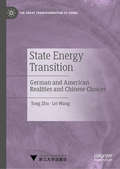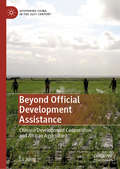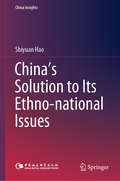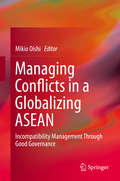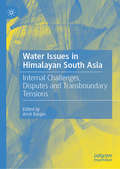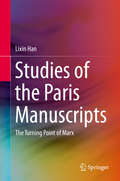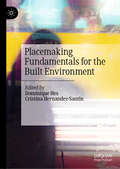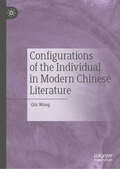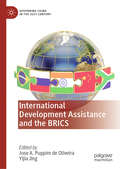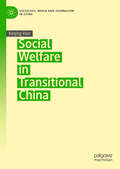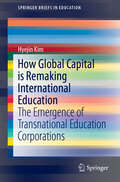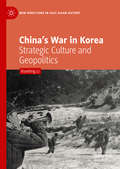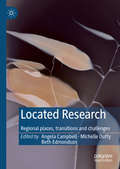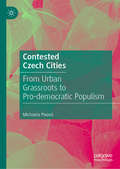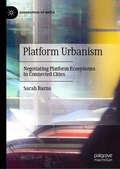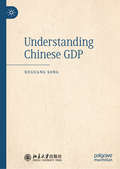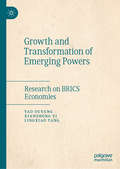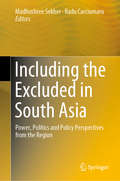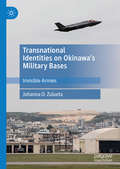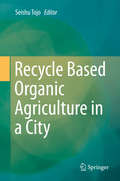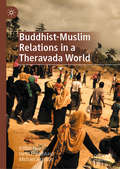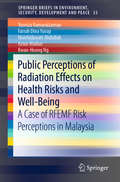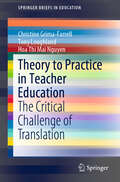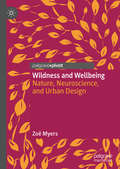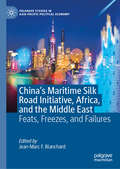- Table View
- List View
State Energy Transition: German and American Realities and Chinese Choices (The Great Transformation of China)
by Tong Zhu Lei WangThis book places a current topic—energy transition—within the historical background of human social development and explores the value and significance of energy transition for economic transition in the course of economic growth. It sheds light on the basic logic and the distinguishing characteristics of energy transition by reviewing the history of energy transition development in order to provide a new perspective for understanding and analyzing China's energy transition considering lessons from the German and American energy transition experiences. This book will be of interest to environmentalists, economists, and journalists.
Beyond Official Development Assistance: Chinese Development Cooperation and African Agriculture (Governing China in the 21st Century)
by Lu JiangThis book investigates China’s contemporary development cooperation mentality and modality through the case of its agricultural engagement with Africa. It identifies three models, namely traditional agro-aid, innovative agro-aid and agribusiness models, of Chinese current agro-development cooperation with Africa, and unpacks the different models by tracing their historical origins and examining the actual practice based on project-level fieldwork conducted in Mozambique and South Africa. The book provides a preliminary and qualitative evaluation of China’s current agro-development cooperation with Africa, and explains the ‘implementation gaps’ as observed on the ground adopting a public policy approach. It also compares the Chinese way of development cooperation with that of the traditional donors (particularly the OECD-DAC members), and calls for a broadening understanding for international development cooperation that can allow win-win ideology and embrace diversified cooperation forms beyond the official development assistance (ODA).
China's Solution to Its Ethno-national Issues (China Insights)
by Shiyuan HaoThis book focuses on the global issue of ethnic problems and examines the theory and practice of how China addresses its ethnic problems from a macro perspective, following the guidelines formulated by the working conference on ethnic affairs of the Central Committee of Chinese Communist Party in 2014. Based on comparative and empirical studies, it also analyzes specific solutions to ethnic problems in contemporary China, such as how the country has succeeded in redressing material inequalities among different ethnic groups, allowing these groups to share in the country’s development, and gain recognition and acceptance.
Managing Conflicts in a Globalizing ASEAN: Incompatibility Management through Good Governance
by Mikio OishiThis book investigates the patterns of conflict management in contemporary Southeast Asia. The region has long been characterized by the twin process of state-formation and nation-building, which has been responsible for most of the region’s intrastate and interstate conflicts. While this process is still ongoing, regional conflicts and their management are increasingly affected by globalisation, which not only serves as a new source of, or exacerbating factor to, conflict, but also makes new instruments available for conflict management. Employing the concepts of incompatibility management and mediation regime, the book analyses the management of seven conflicts in the region: the Rohingya crisis and the Kachin conflict in Myanmar, the Khmer Krom conflict in Vietnam, the West Papua conflict in Indonesia, the political conflict in Thailand, the Mekong River conflicts involving five Southeast Asian countries and China and the transboundary haze problem emanating from Indonesia. The efforts to manage each of them are imagined as constituting a mediation regime, and its effectiveness is assessed in terms of good governance. Among the findings of the book is that the measures of manoeuvring around incompatibilities are employed predominantly in managing regional conflicts. In intrastate conflicts, which mostly involve ethnic minorities, the authorities first aim to eliminate, or impose its own position on, ethnic parties. When this strategy proves unsuccessful, they have no choice but manoeuvre around incompatibilities, which may eventually open up a space for mutual learning. In interstate conflicts, the manoeuvring around strategy works in a more straightforward manner, contributing to regional stability. However, the stability is achieved at the cost of local communities and the natural environment, which absorb the incompatibilities in conflict.
Water Issues in Himalayan South Asia: Internal Challenges, Disputes and Transboundary Tensions
by Amit RanjanThe book looks into the domestic water issues and disputes in the Himalayan South Asian countries, and based on it analyzes trans-boundary water disputes. Himalayan South Asia comprises India, Pakistan, Bangladesh, Nepal, Bhutan, and Afghanistan. All except Afghanistan share river waters with India. Home to some of the major river basins of the world, a part of this region falls into water scarce zone, and according to the United Nations Water Report of 2018 some of them will experience severe water scarcity by 2050.The book also studies water issues in China. Though the country is not a part of the Himalayan South Asia, most of the major rivers of this region originate in China. Over the years, China has been alleged by countries like India for diverting, choking or using the trans-boundary river waters for its purpose. Understanding water competition and issues in China will help one to understand its transboundary water behavior.
Studies of the Paris Manuscripts: The Turning Point of Marx
by Lixin HanThis book is devoted to the studies of Karl Marx’s Paris Manuscripts and presents a new interpretation of early Marx, arguing that his transition to maturity can be found in these manuscripts, and specifically in Comments on James Mill, which was drafted between the First Manuscript and the Second Manuscript. In Comments on James Mill, Marx succeeds in transferring his theoretical framework from the isolated individual to the society and establishes his basic goal, i.e., to explicate the nature of humans and society from the perspective of external economic relations, marking the advent of historical materialism. This study reopens the possibility of interpreting the Paris Manuscripts from the perspective of Hegel. According to the author, it was during the Paris Manuscripts period that Marx shifted his theoretical foundations from Feuerbach to Hegel. On the basis of Hegel’s alienation concept, Marx constructs a new form of alienation theory with “alienation of intercourse” at its core. The theoretical challenge tackled by this book is to restore the authority of alienation theory, and strengthen the position of the Paris Manuscripts in the history of Marx thought, so as to rearrange the traditional landscape of research on early Marx thought.This interpretation, proposed and published for the first time in the world, could compete with the theses of Louis Althusser and Hiromatsu Wataru, which consider Die deutsche Ideologie to be the turning point of Marx. Further, it represents a significant contribution by a Chinese scholar to the international research on Marx.
Placemaking Fundamentals for the Built Environment
by Dominique Hes Cristina Hernandez-SantinThis book is for all those actively working in the built environment. It presents the latest theory and practice of engaging with stakeholders to co-design, develop and manage thriving places. It starts from the importance of integrating design of nature into practice built on a foundation of First Nations understanding of place. The art of engagement of community, government and the development industry is discussed with reference to case studies and best practice techniques. The book then focuses on the critical role placemaking has in supporting resilience and adaptability of communities and looks at issues of leadership and governance. Building on these steps for placemaking, the last parts of the book address economics, evaluation, digital and art based tools and approaches to support projects that aim to create an engaged, contributive, collaborative and active citizen.
Configurations of the Individual in Modern Chinese Literature
by Qin WangThis book aims to demonstrate the multiplicity of configurations of the individual in modern Chinese literature through analyzing several classic texts written by Zhou Zuoren, Lu Xun, Lao She, and Mu Shiying. It attempts to refresh our understanding of the history of modern Chinese literature and indirectly responds to the controversial issue of “individual rights” (or “human rights”) in present-day China, showing that in modern Chinese literature, various configurations of the individual imply political possibilities that are not only irreconcilable with each other, but irreducible to the determination of the modern discourse of “individualism” introduced by the West. A groundbreaking work, it will give valuable context to political scientists and other scholars seeking to understand what "China" means in the 21st century.
International Development Assistance and the BRICS (Governing China in the 21st Century)
by Yijia Jing Jose A. Puppim de OliveiraThis book aims to bring together a series of analyses on international development assistance in the BRICS, the group of countries that includes Brazil, Russia, India, China and South Africa. The BRICS states comprise approximately 3 billion people (~40% of the World’s population) and in terms of GDP account for 16.8 trillion dollars (~22% of the World’s economy). Over the last decade the loose coalition has evolved to become a formal partnership on both economic and political fronts. The first formal meeting of the then-four BRIC countries took place in 2006 during the United Nations General Assembly. This was followed in 2009 by the first summit of BRICS' heads of state, an event which has been convened annually ever since. On 3-5 September 2017, the ninth BRICS Summit was hosted in Xiamen, China. This book, an anthology of scholars based in BRICS countries, provides invaluable insights into the emerging global south coalition, and will be of interest to scholars, employees of NGOs, and China watchers.
Social Welfare in Transitional China (Sociology, Media and Journalism in China)
by Keqing HanAt a time of significant transformations in Chinese society, this book addresses the key issue of social welfare and the reform of the welfare system in 21st century China. Considering both the theory and policy making across a variety of welfare issues which directly impact on the country’s economic development, it examines the development of civil society, changes in social stratification and in social class structure. It notably considers the key questions of welfare in both urban and rural settings, for different population groups such as children, the elderly and the disabled, addressing topical issues of housing, education, public health, poverty and the restructuring of related welfare policy system to tackle China’s key issues. It also considers the impact of migrant workers in China and their social integration, including within the welfare system. Providing a unique insight into how economic globalization and financial crisis affects Chinese social welfare policies, this book is a key read for scholars worldwide interested in social transformation in Chinese society at a time of significant social and economic transition.
How Global Capital is Remaking International Education: The Emergence of Transnational Education Corporations (SpringerBriefs in Education)
by Hyejin KimThis book offers a first look at transnational education corporations, new firms that operate international schools. The quiet rise of transnational education corporations – or TECs – has implications for education systems around the globe, as corporate interests gain a greater stake in the way schools operate. The story of their ascendance links government policies in one corner of the world with profound effects in others. In the past decade, TECs have burst onto the international schooling scene. Private firms, publicly listed firms, and private equity groups have transformed international education into an industry valued at over USD 30 billion. Nowhere has the impact been stronger and more sudden than in Asia. The top three international education firms with a presence in Asia run more than 20 schools in East and Southeast Asia with another six in India. Each educates tens of thousands of students around the globe and has an annual revenue of over USD 300 million. TECs offer a window onto the creation of new markets and the complex positions of governments in regulating social affairs. This book helps readers to understand who these firms are, what they do and how they have grown.
China’s War in Korea: Strategic Culture and Geopolitics (New Directions in East Asian History)
by Xiaobing LiThis book re-visits the history of the Korean War of 1950-1953 from a Chinese perspective, examining Chinese strategy and exploring why China sent three million troops to Korea, in Mao’s words, to “defend the homeland and safeguard the country”—giving rise to what became the war’s common name in China. It also looks into the relatively neglected historical factors which have redefined China’s security concerns and strategic culture. Using newly available sources from China and the former Soviet Union, the book considers how interactive the parameters of defense changes were in a foreign war against Western powers, how flexible Chinese strategy was in the context of its intervention, and how expansive its strategic cultural repertoire was at the crucial moment to “defend the country.” Providing a re-examination of China’s military decisions and strategy evolution, this text narrates the story of successive generations of Chinese leaders and provides a key insight into security issues in China and Northeast Asia today.
Located Research: Regional places, transitions and challenges
by Angela Campbell Beth Edmondson Michelle DuffyThis book examines the diversity of practice in regional research and its contribution to local, national and global issues. Three themes are advanced here: Place and change, Transition and resilience, and Challenges for the future. Contributors embrace frameworks of co-design and transdisciplinary practice to build communities of practice in response to lived experience in regional contexts. Their work highlights the strategic importance of a regional focus at a time when global connectivity and mobility is increasing and the complexity of ‘wicked’ problems demands more than one approach or solution. Such complex problems require nuanced, and at times ‘bespoke’ methodological approaches to better understand and support not just regional adaptation, resilience and transformation, but to manage all these things at a time when change is everywhere.
Contested Czech Cities: From Urban Grassroots to Pro-democratic Populism
by Michaela PixováThis book focuses on urban grassroots movements in post-socialist Czechia and their struggle against unprofessional and nondemocratic urban processes in their cities. It shows that in the context of neoliberal urban restructuring, weakly consolidated democracy, and corporate capture of the local state, urban activists often resort to entering electoral competition as the only efficient way of improving the situation in their cities. The book is based on four case studies from different Czech cities, narrating stories of activists struggling against a controversial flood protection project, the demolition of public buildings, an unhealthy land-use plan, arrogant development, and overpriced city halls. It offers valuable insight into the obstacles created by institutionalized forms of power abuse which urban activists must deal with and discusses the pro-democratic potential of urban grassroot movements’ efforts to overcome their limited ability to influence political processes via standard means of civic engagement and protest activities.
Platform Urbanism: Negotiating Platform Ecosystems in Connected Cities (Geographies of Media)
by Sarah BarnsThis book reflects on what it means to live as urban citizens in a world increasingly shaped by the business and organisational logics of digital platforms. Where smart city strategies promote the roll-out of internet of things (IoT) technologies and big data analytics by city governments worldwide, platform urbanism responds to the deep and pervasive entanglements that exist between urban citizens, city services and platform ecosystems today. Recent years have witnessed a backlash against major global platforms, evidenced by burgeoning literatures on platform capitalism, the platform society, platform surveillance and platform governance, as well as regulatory attention towards the market power of platforms in their dominance of global data infrastructure. This book responds to these developments and asks: How do platform ecosystems reshape connected cities? How do urban researchers and policy makers respond to the logics of platform ecosystems and platform intermediation? What sorts of multisensory urban engagements are rendered through platform interfaces and modalities? And what sorts of governance challenges and responses are needed to cultivate and champion the digital public spaces of our connected lives.
Understanding Chinese GDP
by Xuguang SongThis book provides in-depth analyses on accounting methods of GDP, statistic calibers and comparative perspectives on Chinese GDP. Beginning with an exploration of international comparisons of GDP, the book introduces the theoretical backgrounds, data sources, algorithms of the exchange rate method and the purchasing power parity method and discusses the advantages, disadvantages, and the latest developments in the two methods. This book further elaborates on the reasons for the imperfections of the Chinese GDP data including limitations of current statistical techniques and the accounting system, as well as the relatively confusing statistics for the service industry. The authors then make suggestions for improvement. Finally, the authors emphasize that evaluation of a country’s economy and social development should not be solely limited to GDP, but should focus more on indicators of the comprehensive national power, national welfare, and the people’s livelihood. This book will be of interest to economists, China-watchers, and scholars of geopolitics.
Growth and Transformation of Emerging Powers: Research on BRICS Economies
by Yao Ouyang Xianzhong Yi Lingxiao TangThis book offers a quantitative and qualitative look at the much-discussed BRICS—Brazil, Russia, India, China and South Africa—and explores how their economic ascent might cause global economic realignments in the 21st century. Providing a Chinese perspective on how the global realignment might impact strategic choices and a data-driven approach to the similarities and differences within the so-called BRICS group, this book will be of great interest to economists, international banking professionals, and political forecasters.
Including the Excluded in South Asia: Power, Politics and Policy Perspectives from the Region
by Madhushree Sekher Radu CarciumaruThis book analyses and discusses the multiple dimensions of social exclusion/inclusion seen in South Asia. It not only captures how ‘social exclusion’ is intrinsic to deprivation or deprivation in itself, but also the processes of political engagement and social interactions that the socially excluded develop as strategies and networks for their advancement. Consequently, the book goes beyond structures or agency, and examines the question of a more dynamic approach to provide spaces for the ‘socially excluded’ to self-manage exclusion, thereby raising discussions around the contested positions that underlie development discourse on social inequality.While social exclusion linked to identities is studied, the book argues that hierarchies and inequalities based on social identities cut across and affect various groups of excluded. Consequently, these phenomena create or lead to various processes of exclusion. The book illustrates that social exclusion should not be limited to privileging the differences that characterize the exclusionary processes, but should also comprise underpinning strategies of ‘inclusion’, emphasizing the need to focus on imperatives ‘to include’. As a result, the book acknowledges that social exclusion is not limited to analyzing the different identities that face exclusion, but also understanding the systems and processes that create social exclusion, or create opportunities for inclusion of the excluded.The book addresses readership across academic disciplines (including in the growing field of state capacity and governance), and practitioners (administrators and policy-making communities). Conclusively, the book, provides a platform to intensively exchange the multifaceted and critical issue of social exclusion/inclusion, and thus contributes to inclusive sustainable development discourse.
Transnational Identities on Okinawa’s Military Bases: Invisible Armies
by Johanna O. ZuluetaThis book considers the role of civilian workers on U.S. bases in Okinawa, Japan and how transnational movements within East Asia during the Occupation period brought foreign workers, mostly from the Philippines, to work on these bases. Decades later, in a seeming “reproduction of base labour”, returnees of both Okinawan and Philippine heritage began occupying jobs on base as United States of Japan (USFJ) employees. The book investigates the role that ethnicity, nationality, and capital play in the lives of these base employees, and at the same time examines how Japanese and Okinawan identity/ies are formed and challenged. It offers a valuable resource for those interested in Japan and Okinawa, U.S. military basing, migration, and mixed ethnicities.
Recycle Based Organic Agriculture in a City
by Seishu TojoThis book highlights the significance of urban agricultural production, the technologies and methods for supplying organic materials to the farmland, recovering plant nutrients and energy in cities, and systems for sustaining farmlands in order to produce agricultural crops and supply safe food to citizens. Focusing on the effective recycling of biomass waste generated in cities for use in organic farming, it discusses alternatives to traditional composting, such as carbonizing organic waste, which not only produces recyclable materials but also converts organic waste into energy. Recycling discarded organic matter appropriately and reusing it as both material and energy is the basis of new urban organic farming, and represents a major challenge for the next generation of urban agriculture. As such, the book presents advanced research findings to facilitate the implementation of safe, organic agricultural production with only a small environmental load.
Buddhist-Muslim Relations in a Theravada World
by Iselin Frydenlund Michael JerrysonThis book is the first to critically analyze Buddhist-Muslim relations in Theravada Buddhist majority states in South and Southeast Asia. Asia is home to the largest population of Buddhists and Muslims. In recent years, this interfaith communal living has incurred conflicts, such as the ethnic-religious conflicts in Myanmar, Sri Lanka, and Thailand. Experts from around the world collaborate to provide a comprehensive look into religious pluralism and religious violence. The book is divided into two sections. The first section provides historical background to the three countries with the largest Buddhist-Muslim relations. The second section has chapters that focus on specific encounters between Buddhists and Muslims, which includes anti-Buddhist sentiments in Bangladesh, the role of gender in Muslim-Buddhist relations and the rise of anti-Muslim and anti-Rohingya sentiments in Myanmar. By exploring historical fluctuations over time—paying particular attention to how state-formations condition Muslim-Buddhist entanglements—the book shows the processual and relational aspects of religious identity constructions and Buddhist-Muslim interactions in Theravada Buddhist majority states.
Public Perceptions of Radiation Effects on Health Risks and Well-Being: A Case of RFEMF Risk Perceptions in Malaysia (SpringerBriefs in Environment, Security, Development and Peace #33)
by Yusniza Kamarulzaman Farrah Dina Yusop Noorhidawati Abdullah Azian Madun Kwan-Hoong NgThis book reports on the investigation of the public’s perception of Radio Frequency Electromagnetic Field (RF-EMF) radiation effects on health and well-being, in Malaysia. It elaborates on how understanding the impact of perceived risk is essential in order to investigate the explanatory value and effectiveness of interventions influencing these beliefs. The book expands on the knowledge and understanding of different risk perception related to radiation in order to explain the gap in literature regarding the relationship between risk perceptions that lead to public behaviors. In doing so, the book presents empirical findings of a national study that unveils two key factors affecting public risk perceptions: psycho-graphic and personal factors. It offers a more collective and cultural understanding of public perceptions on radiation risks via a systematic mixed-method research approach. Research in the book also show that while the radiation risk is recognizable and unavoidable, the relevant stakeholders should be more proactive and committed to communicate and rectify the perception of radiation. The book thus serves as a valuable source of reference to understand the debate and to invite more participatory dialogues on radiation risk perceptions among public.
Theory to Practice in Teacher Education: The Critical Challenge of Translation (SpringerBriefs in Education)
by Christine Grima-Farrell Tony Loughland Hoa Thi NguyenThis book offers a theoretically and empirically robust account of what is known about the effective approaches that translate theory to practice in teacher education, presenting evidence from case studies from a diverse range of contexts informed by various methodological foundations. It also provides accounts that support teacher educators involved in both school and university based teacher education.The book offers insights into the translation of theory to practice from the long history of teacher education, the benefit of diverse approaches in terms of the effectiveness of initial teacher education, and the impact of professional standards.
Wildness and Wellbeing: Nature, Neuroscience, and Urban Design
by Zoë MyersWildness and Wellbeing explores the dynamic relationships between urban nature and mental health, offering practical strategies for urban design. Mental health is a leading global issue and our urban environments can contribute to conditions such as depression and anxiety. Presenting the latest research, this book explores how neuroscience can offer new perspectives on the crucial role everyday multisensory interactions with nature can have on our mental wellbeing. These insights can help us (un)design our streets, neighbourhoods and cities, allowing nature to be integrated back into our cities. Wildness and Wellbeing is for anyone interested in the connections between urban ecology, health, environmental science, planning, and urban design, helping to create biodiverse cities for mental health.
China’s Maritime Silk Road Initiative, Africa, and the Middle East: Feats, Freezes, and Failures (Palgrave Studies in Asia-Pacific Political Economy)
by Jean-Marc F. BlanchardThis book analyzes the progress of the MSRI, highlights the political and economic factors affecting its realization, and offers insights into the political and economic implications of China’s endeavor. It focuses specifically on countries within Africa and the Middle East to provide a basis for a substantive examination of these issues in a manner sensitive to the milieu in individual countries and relevant regions. It represents the final volume in a well-received series on China’s Maritime Silk Road Initiative (MSRI), which, so far, includes books covering China’s MSRI and South Asia (Palgrave, 2018) and China’s MSRI and Southeast Asia (Palgrave, 2019). This book will interest scholars of China, international relations, and the relevant regions, journalists, and policymakers.
